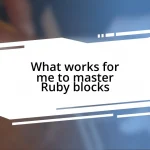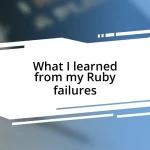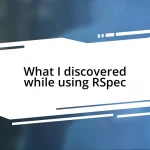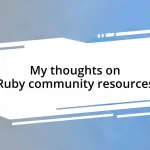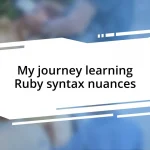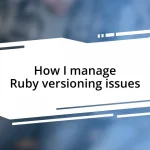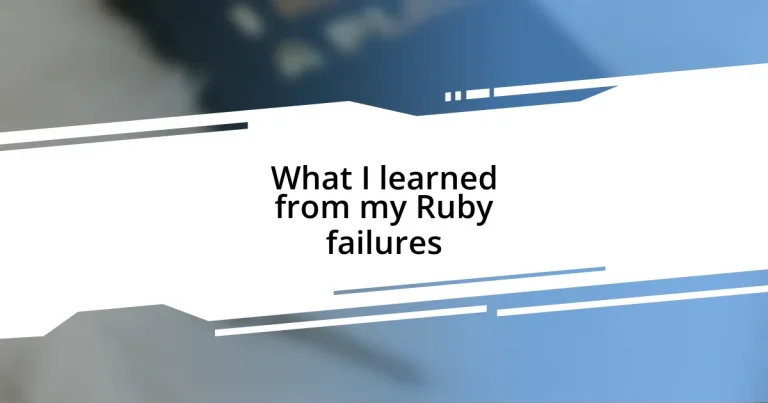Key takeaways:
- Embrace debugging tools and processes to identify errors effectively, transforming frustration into clarity.
- Maintain thorough documentation to improve understanding and create a useful reference for future coding challenges.
- Prioritize collaboration and feedback from peers to enhance learning and discover diverse solutions.
- Share coding experiences, especially failures, to foster community support and collective growth.
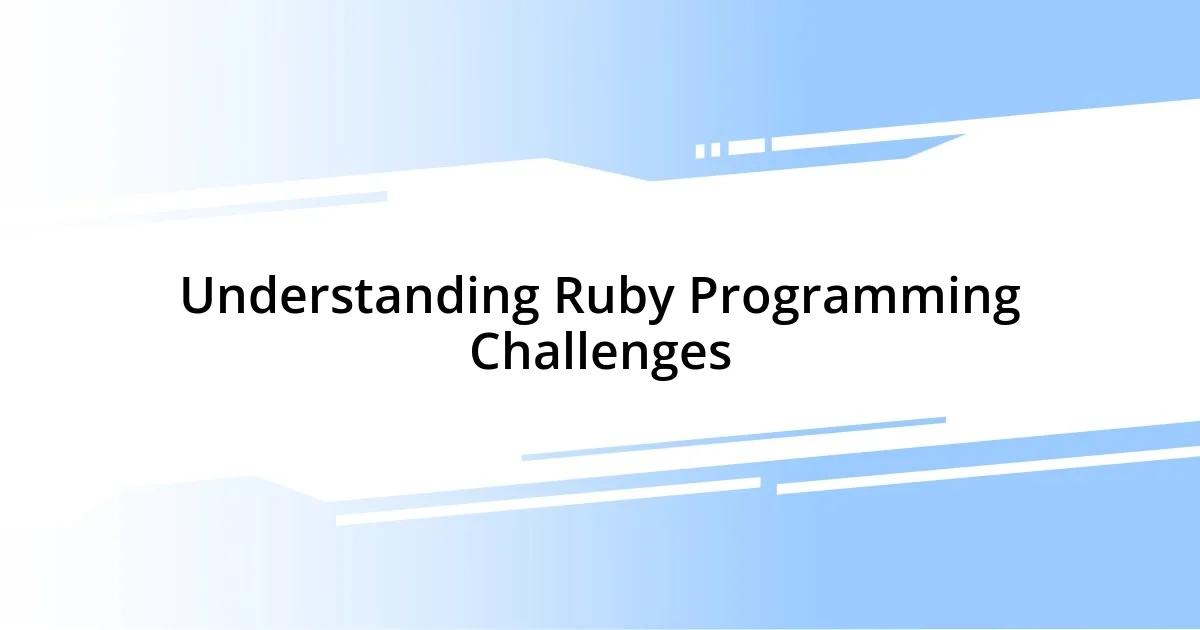
Understanding Ruby Programming Challenges
Ruby programming, like any language, has its quirks, and I often found myself stumbling over its syntax when I first started. I remember spending hours debugging a simple method, feeling like I was chasing my own tail. Have you ever felt that frustration when you think you understand something, only to be thrown off by a minor detail?
One of the challenges I’ve encountered is the dynamic nature of Ruby. It allows for flexibility, but this also means that errors can sneak up on you when you least expect them. I once wrote code that seemingly worked perfectly, only to experience a critical failure later on due to a missing data type check. Isn’t it ironic how that flexibility can sometimes lead us down a confusing path?
Another significant hurdle is my internal struggle with Ruby’s conventions versus my personal coding style. I recall a project where I tried to deviate from standard practices to make it “my own,” leading to a tangled mess of code nobody, including me, could easily read. Have you ever tried to innovate, only to realize that sticking to the established guidelines might save a lot of headaches?

Common Ruby Coding Mistakes
When diving deeper into my Ruby learning curve, I realized that even small oversights can bring a project to its knees. For instance, I remember a night when I overlooked defining a variable before using it. The resulting “undefined method” error popped up right when I least expected it, and I thought I had lost my mind. It’s those moments that make you realize how crucial it is to double-check every line of code.
Here are some common mistakes I’ve personally encountered while coding in Ruby:
- Forgetting to end blocks: It’s easy to miss an
endstatement, which can lead to confusing syntax errors. - Not using symbols when needed: I once confused strings and symbols, which caused performance issues and made debugging a nightmare.
- Misunderstanding method arguments: Passing the wrong arguments can lead to unexpected results; I did this while implementing a method and spent ages tracking it down.
- Overlooking scope issues: I often forget how variable scope works in Ruby, which once led me to access a variable I thought was within scope but wasn’t.
- Ignoring warnings: I learned the hard way that warnings in Ruby are there for a reason; I ignored one that later turned into an actual bug.
These errors may feel frustrating, but they serve as great teachers in my Ruby journey, reminding me to be vigilant and attentive.
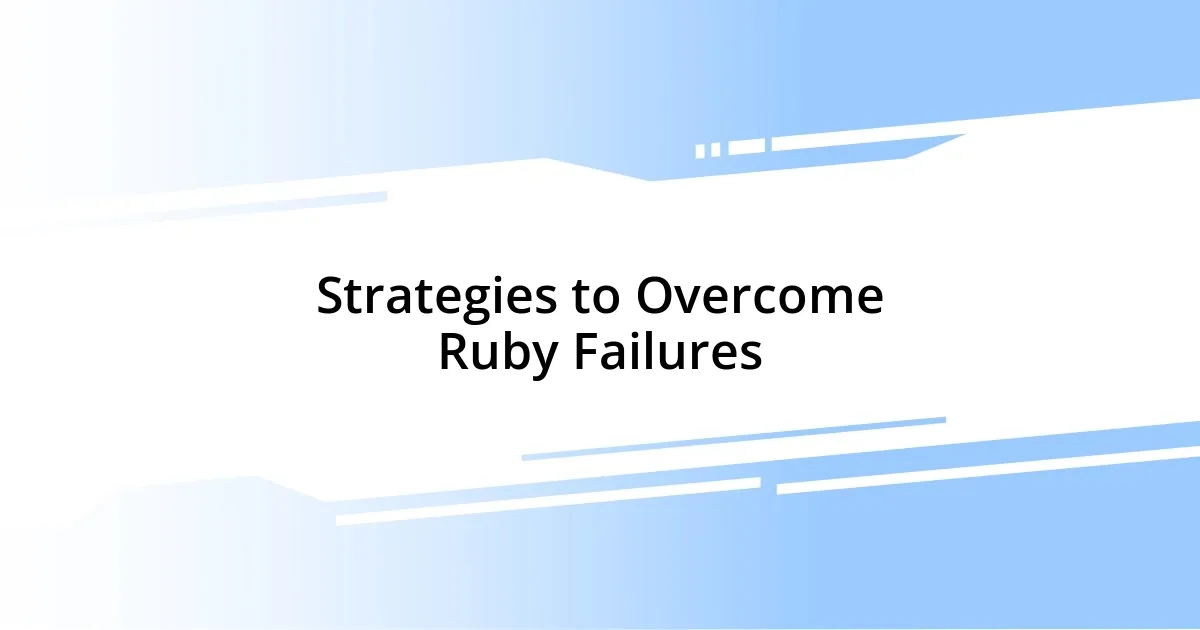
Strategies to Overcome Ruby Failures
When it comes to overcoming Ruby failures, one strategy that’s worked wonders for me is embracing the power of debugging tools. Initially, I used to dread activating a debugger, perceiving it as a sign of weakness or a lack of understanding. However, once I gave it a real shot, I discovered how invaluable it is to step through my code line by line. Have you experienced that “aha!” moment when you spot the error directly in front of you? Now, I can’t imagine coding without it.
Another effective approach is adopting a consistent code review process. In my earlier projects, I often rushed through my code without a second pair of eyes. I vividly recall a colleague catching a critical mistake in my logic before we deployed an app, saving us from an impending disaster. Engaging peers in a review process not only sharpens my skills, but it opens avenues for collaborative learning that enriches our collective knowledge. How often do you take a moment to seek feedback?
Finally, creating a habit of thorough documentation has significantly helped me navigate my coding blunders. There were times when I scratched my head trying to recall the intention behind a snippet of code I had written weeks earlier. By maintaining clear notes and comments, I not only improve my understanding but also ease my future self’s burden. I’ve come to appreciate the contrast between the confusion of poorly documented code and the clarity that comes from a well-commented project. It’s like holding a roadmap when venturing into the unknown.
| Strategy | Description |
|---|---|
| Debugging Tools | Utilizing debugging software allows for a detailed inspection of code execution, facilitating error identification. |
| Code Reviews | Encouraging peer reviews promotes collaborative learning and helps catch errors before they escalate. |
| Documentation | Consistent documentation clarifies the purpose of code, aiding future reference and reducing confusion. |

Learning from Debugging Techniques
Debugging techniques have truly transformed how I approach coding in Ruby. One memorable instance was when I spent an entire afternoon chasing an elusive bug in my application. I started using pry, a powerful debugging tool, and it felt like I finally had a flashlight in a dark cave. Suddenly, I could inspect variables and see their values in real time, which opened my eyes to mistakes I couldn’t have spotted otherwise. Have you ever felt that sense of relief when things start to click into place?
Another thing I’ve learned through debugging is the importance of systematic problem-solving. I recall a time where I broke down an issue meticulously, creating a step-by-step flow to follow. By isolating each function and checking what returned unexpected results, I found not just the error, but also a better way to structure my code. It made me think: how often do we overlook such a straightforward method in our rush to find a solution? Taking a moment to organize my thoughts can provide clarity that speeds up the debugging process.
Finally, I’ve come to value the emotional aspect of debugging. There was a period when I felt overwhelmed, facing error after error. It was frustrating, but then I started to reframe these moments as opportunities to learn. Instead of viewing bugs as failures, I began to see them as stepping stones toward mastery. How can we shift our mindset to embrace mistakes and allow them to drive our growth? It’s become a powerful lesson for me, reminding me that every stumble is an invitation to deepen my understanding of Ruby.
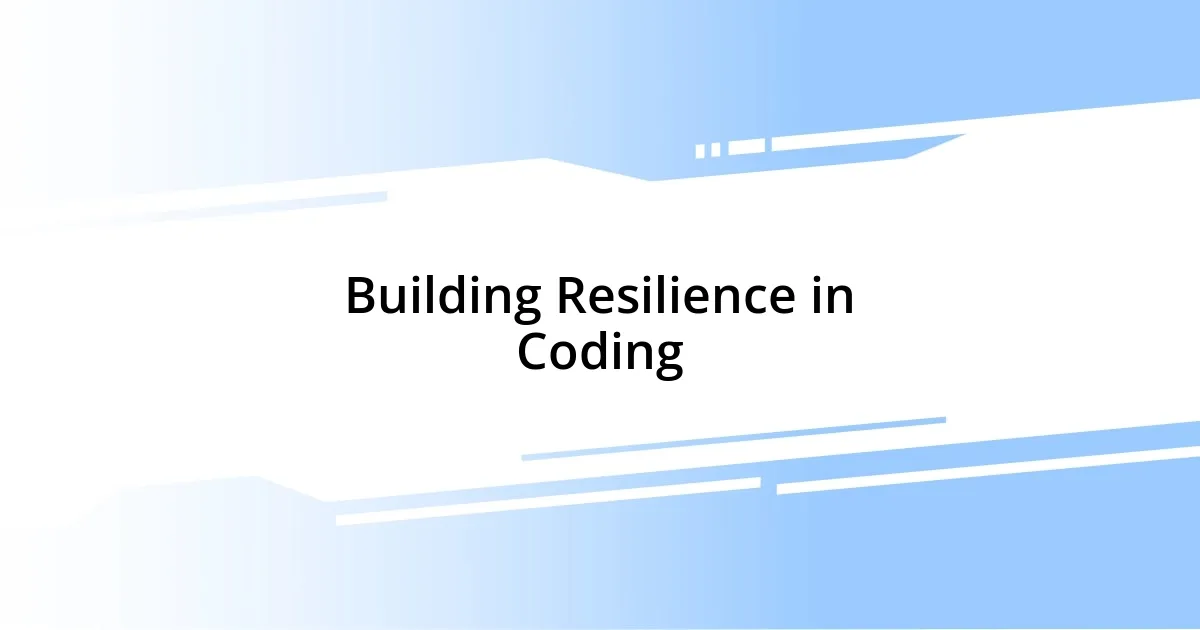
Building Resilience in Coding
Building resilience in coding is, for me, about cultivating a growth mindset. I remember the first time I encountered a complex error that stumped me for days. I felt defeated at times, but then I realized that wrestling with challenges is part of the journey. This epiphany opened my eyes to the idea that every failure is, in fact, a building block for my future successes. Have you ever found yourself in a similar situation where persistence led you to unexpected breakthroughs?
Another important aspect of resilience is learning to embrace uncertainty. I often find myself deep in a project, unsure if I’m heading in the right direction. There was a moment when I was refactoring a core component of my application, and doubt crept in about whether I was making the right choices. Instead of panicking, I decided to trust my instincts and allow for experimentation. That leap of faith not only enhanced my problem-solving skills but also empowered me to take creative risks. Isn’t it fascinating how stepping outside of our comfort zone can lead to the most rewarding outcomes?
Ultimately, resilience comes from building a supportive community around us. I vividly recall a session with a small group of fellow developers, where we shared our most significant coding blunders. We laughed, we empathized, and I left feeling a sense of belonging that fueled my determination to tackle future challenges. Surrounding ourselves with others who understand what we’re going through can lighten the emotional load of failure. How often do you reach out to your coding circle when you need encouragement? Knowing you’re not alone can be a game changer.
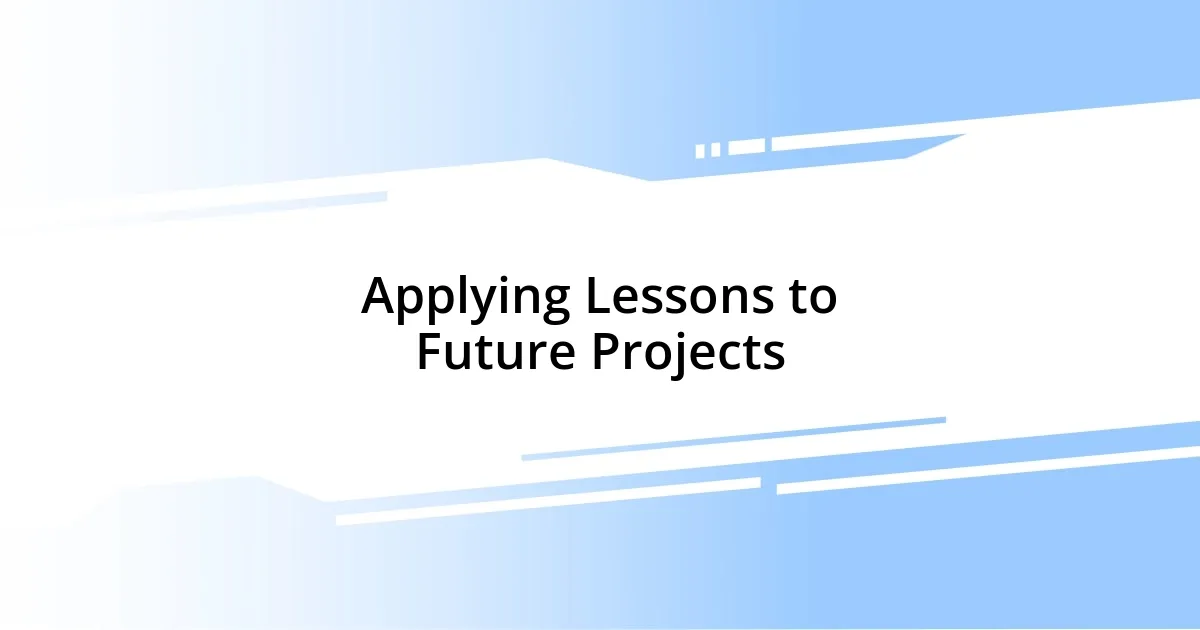
Applying Lessons to Future Projects
Applying the lessons learned from past Ruby failures has significantly shaped how I tackle new projects. I remember the initial dread I felt when I made critical architectural choices that didn’t pan out as expected. However, reflecting on those missteps allowed me to create a checklist for future systems. It might sound simple, but this practice ensures I take a holistic view before jumping into coding. Have you ever felt the urge to dive in, only to wish you had slowed down first?
One critical lesson is about documentation. Early on, I neglected to keep thorough notes on my debugging processes, which meant I had to start from scratch when similar issues arose later. Now, I diligently document what works and what doesn’t in each project. This habit not only saves me time in the long run but also provides a reference point that boosts my confidence when tackling complex problems. Imagine having a roadmap for your coding journey—doesn’t that sound empowering?
Lastly, I’ve learned to prioritize collaboration. I can recall a project where I thought I could handle everything solo, only to find myself bogged down. Reaching out for feedback and support transformed my approach. I realized that inviting others into the process not only diversifies solutions but also catapults my learning curve. When was the last time you sought input from a peer? It’s amazing how sharing your experiences can lead to richer insights and stronger outcomes.
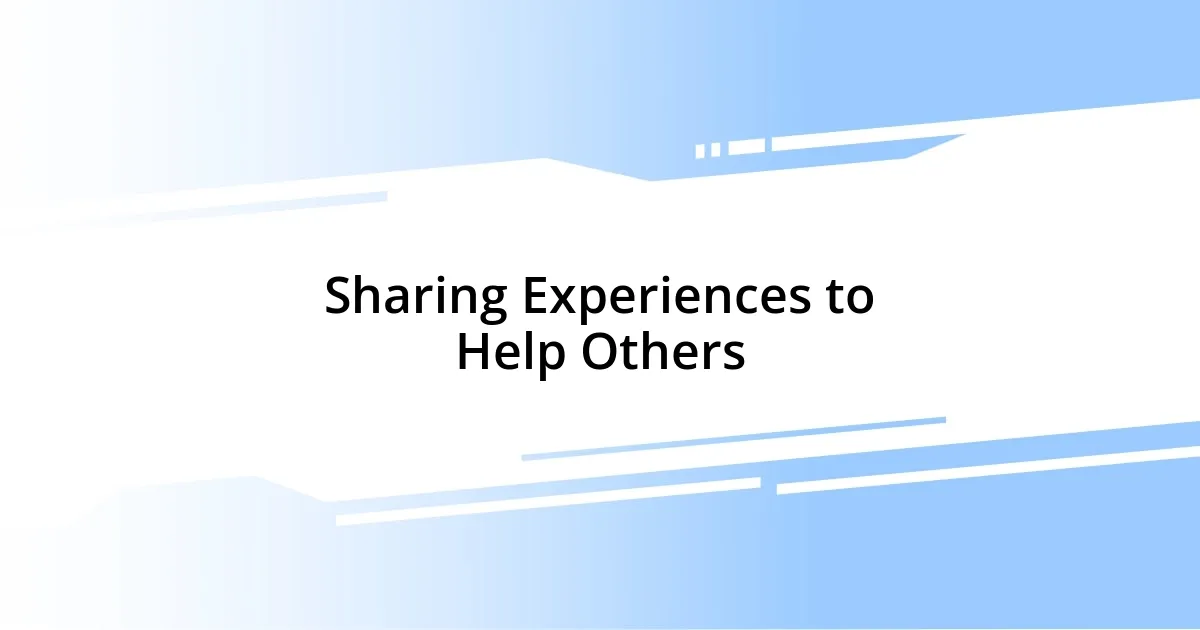
Sharing Experiences to Help Others
I’ve come to believe that sharing our coding experiences—especially failures—can create a powerful ripple effect within our community. I recall a workshop where I hesitated to share a particularly embarrassing bug I encountered during a project. However, when I finally opened up, I saw nods of recognition and understanding. Those moments of vulnerability not only resonated with others, but they also fostered a sense of camaraderie. Have you ever found that your own struggles helped someone else realize they’re not alone?
As I reflect on that experience, it strikes me how collective storytelling can lead to collective growth. I often think back to a mentor who shared his early struggles with Ruby, emphasizing how critical it was for him to embrace and learn from mistakes. The insight he provided shaped my own approach to coding and problem-solving. Isn’t it fascinating how one story can alter the trajectory of another’s journey? When we bravely own our narratives, we empower others to do the same.
Moreover, I’ve learned that the act of articulating my experiences creates clarity for both myself and others. After one significant failure, I decided to write a blog post about it. The process of reflection not only reinforced my learning but also provided a resource for those who stumbled upon it later. Knowing that my struggles could serve as a guide for someone new to Ruby felt incredibly fulfilling. Have you ever considered documenting your own journey with the aim of lighting the way for others? In sharing, we cultivate an environment rich in collaboration and support.

